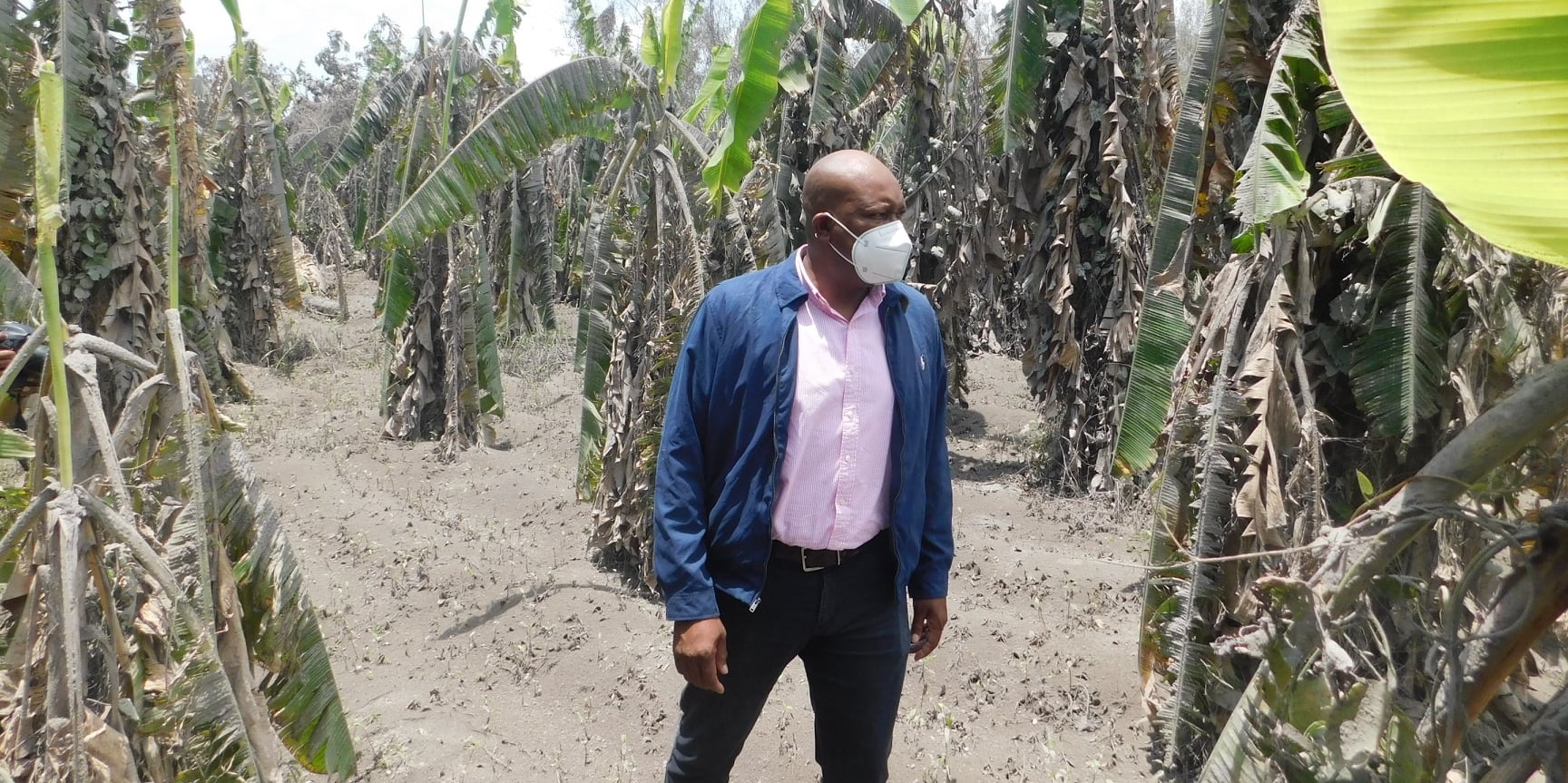Due to this emergency, some 30,000 people had to be evacuated from the area, mostly smallholder farmers who in some cases lost all their crops and animals.

San José, 20 August 2021 (IICA) – As part of the international efforts to help Saint Vincent and the Grenadines recover its agricultural sector, strongly impacted by this year’s eruptions of the La Soufrière volcano, this Caribbean country received an important donation of seeds from Brazil, facilitated by the Inter-American Institute for Cooperation on Agriculture (IICA).
The emergency situation in the island nation began in April with the first eruption, which was followed by another 32. The lands closest to the volcano are used for agricultural production and were the most affected by the ashfall. Some 30,000 people had to be evacuated from the area, mostly smallholder farmers who in some cases lost all of their crops and animals.
IICA quickly coordinated a solidarity effort throughout the region, receiving generous responses from Argentina, Canada, Chile, Uruguay and Brazil, among other countries.
In the coming days, Saint Vincent and the Grenadines will also receive a significant amount of seeds donated by Argentina, Uruguay and Chile, which will be sent to the Caribbean by the White Helmets, a humanitarian aid body of the Argentine Foreign Ministry. From the outset, the White Helmets and IICA have worked together to collaborate in the emergency of this Caribbean country.
A donation from the company Bayer is also expected to arrive shortly from the United States.
On this occasion, the Minister of Agriculture, Forestry, Fisheries, Rural Transformation, Industry and Labor of Saint Vincent and the Grenadines, Saboto Caesar, received a shipment of 11,500 packages of seeds from Brazil in the country’s capital, Kingstown. The seeds are of 15 different varieties of vegetables, such as lettuce, carrots, squash, watermelon, parsley, tomatoes, radishes, and cabbage.
Minister Saboto explained that the food production sector in Saint Vincent and the Grenadines is already recovering from the catastrophe thanks to state aid provided to small farmers, but pointed out that his country still needs international solidarity. Local food production is basically supported by family producers: some 8,000 farmers and 1,500 fishermen are registered in this country.
“International solidarity has brought us reassurance. These seeds will be immediately distributed among small farmers and will benefit them and consumers. Agriculture has a central role to play in the growth of our country. We are currently conducting studies to identify the best areas for the production of agricultural commodities , with the aim of boosting national production and reducing imports”, said Saboto during the ceremony where he received the seeds, which was held in the Ministry with the presence of IICA’s technical specialist in this island nation, Michael Dalton; the virtual participation of the Director General of IICA, Manuel Otero; special advisor Jorge Werthein; and the Representative of the Institute in Brazil, Gabriel Delgado.
The donation was made by the company Feltrim Sementes , a member of the Brazilian Seed Trade Association (ABCSEM), which acted as intermediary.
“This situation must be handled with the empathy it deserves. We must be able to help our brothers and sisters in Saint Vincent and the Grenadines and Guyana. Seeds are a synonym of life, and it is our duty to bring food and life to people in need”, said Marcelo Paccotte , executive director of ABCSEM.
Saint Vincent and the Grenadines, like other Caribbean nations, has historically depended on food imports, a situation that aggravated the consequences of the Covid-19 pandemic due to the obstacles faced by international trade. In this sense, Minister Saboto highlighted the importance of technical schools to motivate young people to become involved in agriculture and establish themselves in rural areas, in order to increase the country’s productivity, guarantee food security and improve its economic and social conditions.
The minister thanked Brazil for the seed donation and expressed special appreciation for the solidarity of IICA. After the first eruption of the La Soufrière volcano, the Institute immediately called on the international community to support the efforts to recover the agriculture of Saint Vincent and the Grenadines.
For his part, the Director General of IICA, Manuel Otero, pointed out that “after the first eruption of the La Soufrière volcano, with its devastating consequences for the economy and for the lives of the people, we have tried to fulfill our role as a bridge institution by encouraging more solidarity efforts from other countries in the region. This donation from Brazil is a testimony of the closeness of the hemisphere with our brothers and sisters of Saint Vincent and the Grenadines. As friends, we are ready to help those who are suffering”.
Mr. Otero reiterated IICA’s willingness to continue providing its support and thanked Minister Saboto for his decision to implement a more resilient agriculture.
IICA mobilized its human and financial resources to support the population of this Caribbean nation and also joined the Stronger Together Campaign, launched by the Organization of Eastern Caribbean States (OECS) to collaborate with the recovery efforts.
In Argentina, the White Helmets and IICA organized a solidarity campaign together with personalities from culture and sports. The Institute also facilitated the exchange of experiences with technicians from the Guatemalan and Costa Rican Ministries of Agriculture on how to manage soils affected by volcanic eruptions. This brought about the mobilization of different Canadian growers’ associations, which will provide inputs and technical support to develop vegetable production in Saint Vincent and the Grenadines.
More information:
Institutional Communication Division











